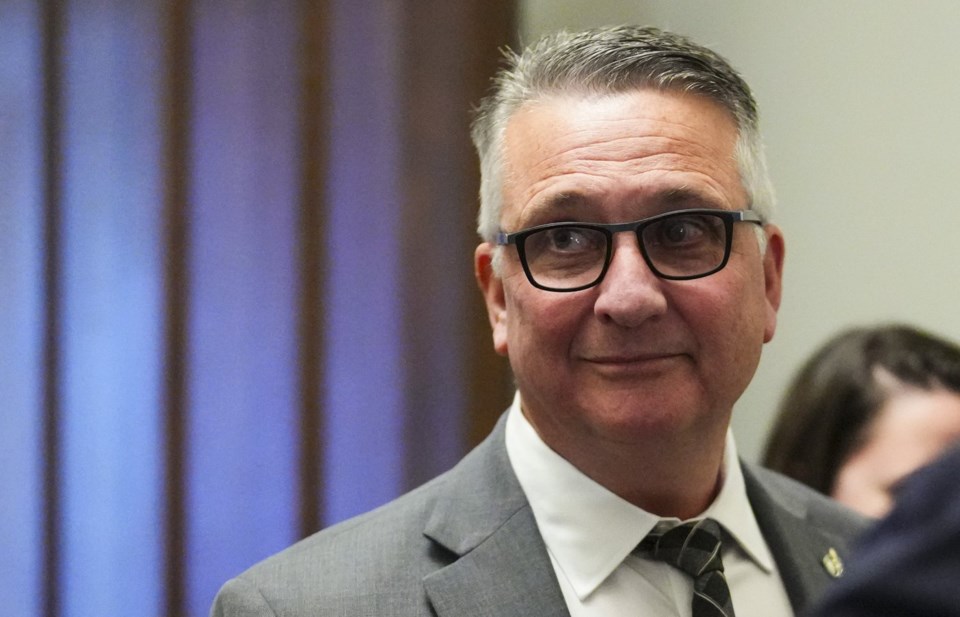Farmer Bill Prybylski says China’s planned tariff on canola seed wasn’t factored into his business equations this year.
The president of the Agricultural Producers Association of Saskatchewan says the 75.8 per cent preliminary duty, announced Tuesday, has already caused canola prices to fall by $1 per bushel.
That translates to a loss of about $200,000 for his farm.
“That’s a pretty significant financial hit,” said Prybylski, who farms northeast of Regina near Yorkton.
“Most canola producers will be seeing the same thing, just depending on their number of acres and yields.”
Canola is considered a high source of farm revenue for Canadian producers, but it’s also among the most expensive to grow.
Many farmers have begun harvesting their crops and are planning to sell them at local elevators, possibly at lower prices than they were a few days ago.
Dean Roberts, who farms near Coleville in west-central Saskatchewan, said canola makes up about a quarter of his operation.
“It’s a very important crop and our second largest customer just effectively closed their market to us,” said Roberts, chair of SaskOilseeds.
“(The tariff) is very impactful to individual farmers, because this is our livelihood, this is how we feed our families, this is how we keep our operations going.”
Andre Harpe, a farmer near Grande Prairie in northern Alberta, said the tariff announcement was an "absolute shock."
"After the harvest, then decisions will start being made on how many acres of canola are we going to grow (next year)," said Harpe, who is also board chair of Alberta Canola.
China has said the tariff would start Thursday, nearly a year after Beijing launched an anti-dumping probe into Canadian canola. The investigation is in response to Canada's 100 per cent tariff on Chinese electric vehicles.
Ottawa has said China has until September, when its investigation formally ends, to make a final decision on the duties, but it can extend the deadline by six months.
China's Ministry of Commerce argued Canadian canola companies were "dumping" the product into the Chinese market, hurting its domestic canola oil market.
Ottawa and canola farmers have rejected that claim, saying companies are following international rules-based trade. Dumping is a trade practice where exports from one country flood a foreign nation's market with goods at prices lower than what the commodities cost domestically, undercutting local industry.
The Canadian Canola Growers Association says the industry contributes more than $43 billion to the country’s economy and employs roughly 200,000 people.
China is the largest export market for Canadian canola seed, taking up about 67 per cent of Canada’s shipments — worth billions of dollars.
Agriculture Minister Heath MacDonald and International Trade Minister Maninder Sidhu were to meet Wednesday with canola groups to discuss the issue.
The ministers have said they remain ready to speak constructively with Chinese officials to address their trade concerns.
Last year, Ottawa imposed its tariff on Chinese-made electric vehicles and 25 per cent tariffs on Chinese steel and aluminum. Beijing retaliated with 100 per cent tariffs on Canadian canola meal and oil. China's latest move on canola seed now means all canola products face levies.
Conservative member of Parliament Michelle Rempel Garner said the tariffs were "completely avoidable" and require an immediate response from the Liberal government.
"As a western Canadian, I cannot stress how devastating this is to our economy and to our agricultural producers," the Alberta MP told reporters on Parliament Hill.
Alberta, Saskatchewan and Manitoba, with assistance from Ottawa, have offered increased supports to producers through the AgriStability farm income stabilization program. It aims to increase compensation rates for farmers should their margins decline.
Prybylski said while the program is helpful, it won’t be enough to weather the tariff storm.
He said he’s counting on Ottawa to negotiate a settlement with Beijing.
“The consensus is that these tariffs are in retaliation for the (electric vehicle) tariffs Canada implemented against China. We need the federal government to be at the table,” he said.
Producers who’ve already locked in their canola at a future price on a contract shouldn’t expect an immediate hit, Prybylski said. But he worries for those who don’t have contracts and need to sell immediately.
Roberts said there’s not much farmers can do, as many sell their crops around harvest time to generate much-needed cash to pay off inputs and debt.
“We’re price-takers in the market,” he said.
“I’m a long way from Ottawa. I’m even further from Beijing. So for me to understand what the right decisions are is very tough. But I do know the implications of my farm gate are very, very real.”
This report by The Canadian Press was first published Aug. 13, 2025.
— With files from Kyle Duggan in Ottawa and Jack Farrell in Edmonton
Jeremy Simes, The Canadian Press



